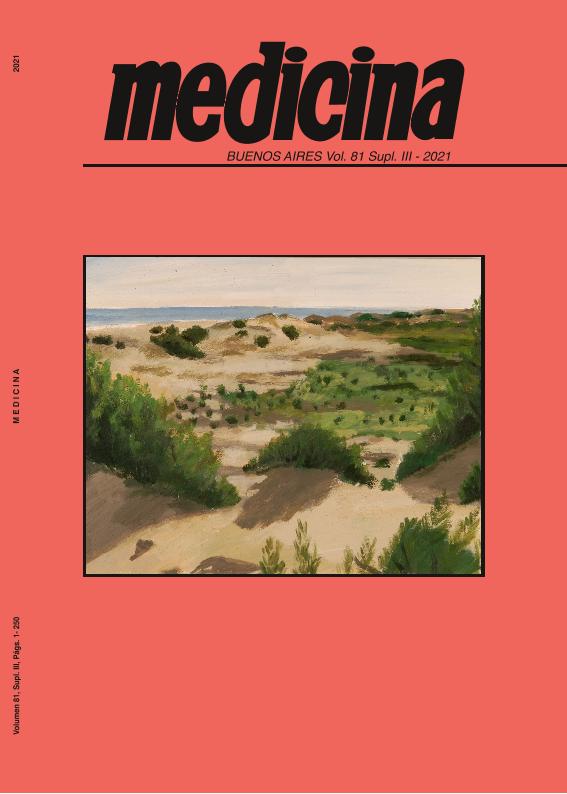Evento
Metformin induce autophagy and UPR under intracystic glucose deprivation in in vitro metacestodes and in vivo experimental models of Echinococcus granulosus.
Loos, Julia Alexandra ; Negro, Perla; Ledo, Camila
; Negro, Perla; Ledo, Camila ; Nicolao, María Celeste
; Nicolao, María Celeste ; Pavía, Natalia; Díaz, Malena; del Rio, Marianela Victoria
; Pavía, Natalia; Díaz, Malena; del Rio, Marianela Victoria ; de la Canal, Laura
; de la Canal, Laura ; Cumino, Andrea Carina
; Cumino, Andrea Carina
 ; Negro, Perla; Ledo, Camila
; Negro, Perla; Ledo, Camila ; Nicolao, María Celeste
; Nicolao, María Celeste ; Pavía, Natalia; Díaz, Malena; del Rio, Marianela Victoria
; Pavía, Natalia; Díaz, Malena; del Rio, Marianela Victoria ; de la Canal, Laura
; de la Canal, Laura ; Cumino, Andrea Carina
; Cumino, Andrea Carina
Tipo del evento:
Reunión
Nombre del evento:
LXVI Reunión anual de la Sociedad Argentina de Investigación Clínica (SAIC); LXIX Reunión Anual de la Sociedad Argentina de Inmunología (SAI); LIII Reunión Anual de la Asociación Argentina de Farmacología Experimental (AAFE) y XI Reunión Anual de la Asociación Argentina de Nanomedicinas (NANOMED-AR)
Fecha del evento:
17/11/2021
Institución Organizadora:
Sociedad Argentina de Investigación Clínica;
Sociedad Argentina de Inmunología;
Asociación Argentina de Farmacología Experimental;
Asociación Argentina de Nanomedicinas;
Título de la revista:
Medicina (Buenos Aires)
Editorial:
Fundación Revista Medicina
ISSN:
0025-7680
Idioma:
Inglés
Clasificación temática:
Resumen
Metformin (Met) is an experimental antiechinococcal drug (Loos etal., 2017; 2020), which inhibits the complex I of the respiratory chainin in vitro Echinococcus larval stage, resulting in an indirect AMPKactivation (by an increased ADP/ATP ratio due to ATP drop) anda subsequent inhibition of TOR signaling with autophagy induction(Loos et al., 2015, 2018). Here, we demonstrated that Met mediatedthe dephosphorylation of Eg-TOR in Ser3122, which trigger the reductionof its activity in metacestodes, responding also to exogenousinsulin and rapamycin. Moreover, Met induced the overexpressionof TFEB, a hub transcription factor that regulates lysosome biogenesis,lipid catabolism and autophagy in metazoa. In concordance withthe mitochondrial depolarization induced by Met, an increase in totalcellular Pi (an activator of PFK1) was detected, with stimulation ofglycogen consumption (glycogenolysis) and, increase of glycolysisand the lactate fraction. Cumulatively, this supports the reductionin the glucose intracystic content demonstrated in vitro, as well asin two different experiments (50 and 250 mg/kg/day of Met) in theechinococcosis murine model. In this line of evidence, the energystarvation induced by Met causes endoplasmic reticulum stress-mediatedunfolded protein response (UPR). In presence of a mannose-specific lectin (Helja-FITC) and using confocal microscopy, wefound that parasite cells expanded their ER volume at least 3-foldunder treatment with Met. Using thapsigargin, tunicamycin andMet-treated parasites, we validated the IRE activity by XBP1 splicingand demonstrated that Met induced the mRNA of Bip/Grp78d.In this context, we described that UPR induced after Met-treatmentcan take place upon glucose deprivation in the parasite, suggestingthat the anthelminthic effects of Met result from sustained autophagymediated by activation of the AMPK-TOR-TFEB signaling pathwayinterdependent with UPR activation, especially through the IRE/XBParm.
Palabras clave:
METFORMIN
,
AUTOPHAGY
,
UPR
,
ECHINOCOCCUS GRANULOSUS
Archivos asociados
Licencia
Identificadores
Colecciones
Eventos (IIPROSAM)
Eventos de INSTITUTO DE INVESTIGACIONES EN PRODUCCION, SANIDAD Y AMBIENTE
Eventos de INSTITUTO DE INVESTIGACIONES EN PRODUCCION, SANIDAD Y AMBIENTE
Eventos(IIB)
Eventos de INSTITUTO DE INVESTIGACIONES BIOLOGICAS
Eventos de INSTITUTO DE INVESTIGACIONES BIOLOGICAS
Citación
Metformin induce autophagy and UPR under intracystic glucose deprivation in in vitro metacestodes and in vivo experimental models of Echinococcus granulosus.; LXVI Reunión anual de la Sociedad Argentina de Investigación Clínica (SAIC); LXIX Reunión Anual de la Sociedad Argentina de Inmunología (SAI); LIII Reunión Anual de la Asociación Argentina de Farmacología Experimental (AAFE) y XI Reunión Anual de la Asociación Argentina de Nanomedicinas (NANOMED-AR); Argentina; 2021; 1-5
Compartir



